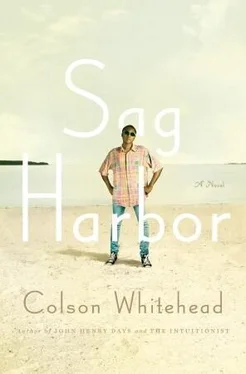He kept changing the channel out of habit. CNN and the Nightly News were the only things he watched. To him, the faces on the screen — the anchors, the newsmakers, this day's victim, and all the everyday heroes — were a parade of shifting masks. Props of an idea, like the souvenirs our friends and neighbors brought back across the Atlantic. He saw the true faces beneath and called them out. He didn't need a teleprompter; he knew his commentary by heart. A Televangelist snuck his hand into the collection box. “Problem with black people is that they waste all this time praying to God when they should be out looking for a job.” Welfare Moms exposed! “Nobody ever gave me anything. Didn't ask for anything. Some people need to get off their asses.” A Hot Young Thing sued her boss for squeezing her behind. “Women always talking about how they want to be equal, but they get mad at you if you don't hold the door for them.” The Undersecretary of Bullshit explaining why he wanted to bomb some country. “Whitey always trying to blow somebody up. They should put all those warmongers on an ice floe in the North Pole with the penguins, let them blow each other up and leave us the hell alone.” He was our talking head. The only channel we got.
Tock, thunk, rasp, poomp .
Nobody ever gave him anything, and he never asked. His parents died before I was born. I didn't know much about them because he never talked about them. I knew his stand on every issue, but his parents were a blank. Except for the fact that they never gave him anything. He washed dishes at an uptown restaurant to pay for college, the first one in his family to go. After that, grad school. “I didn't know I could do anything else,” he told us. “Back then if you wanted to make something of yourself you went into the Sacred Seven”—he ticked them off on his fingers—“Teacher, Preacher, Doctor, Lawyer, Nurse, Dentist. Undertaker. If white people aren't going to do it, we have to do it ourselves. Separate and as equal as we can make it. I looked around and thought, Everybody gets sick. And all the black people I knew, they had bad feet. So I became a foot doctor.” He did two days a week at Harlem Hospital and three days at his office on Morningside Drive. I never saw it. I assume it existed. He made a good living. He was right — black people had some bad feet, although it should be pointed out that he worked with a self-selecting sample.
I will add here the personal observation that being a podiatrist taught you how to really put your foot up someone's ass.
My mother returned from the beach.
“You finish making that macaroni salad?” my father asked.
“It's here in the fridge,” she said.
“Your mother makes the best macaroni salad.”
She poured herself some white wine. “It turned out to be a nice beach day.”
“They're all down there?”
“Where else would they be?” She looked over at me. “You going to stay inside all day?”
“Bobby's coming over. We're going driving around.”
“You're going to stay for some barbecue?” my father asked. “I got that good chicken ‘comin’ right up.'”
“I already talked to him.”
A shadow crossed his face but then that gene we shared kicked in, the one that said, Don't show it. To see his expression, he was back at his timetables, when to put on what, turn this, take off that. He was a master griller. It was good I was getting out of there.
The fire was ready. He scraped the pile into an even red layer — none of that hoity-toity direct/indirect heat-zone crap for him. Behind him, this old lady I didn't recognize came up from the beach, her gray-purple hair poking out from beneath a big floppy straw hat. Bet me money and I would have guessed she was in her sixties, but I found out she was twenty years older. She carried her age in her movements, in her tiny hesitant steps and the tremble in her hand as it skipped along the rail. “Gail, is that you?” she said, trying to see into the living room. “Louisa said you might be up here.”
My mother rushed out to the deck. “Mrs. Russell!”
“Natalie,” my father said. “How you doing, girl?” They gave her big hugs. She had to be an Azurest old-timer to get this kind of treatment, one of my grandparents' friends, which was confirmed when she looked around and told my mother, “I remember when your father started clearing this lot.” No matter how old you were, you remembered the trees going down.
“Benji — come out and say hello!” my mother said.
When I shook her hand, Mrs. Russell winced. “That's some handshake.”
Was that some kind of a joke? She told me she hadn't seen me since I was a baby. “Your grandfather — he was just the nicest gentleman that ever came out here. A real one of a kind.”
“Doesn't she look good?” my father asked me. “I swear you haven't aged a day, girl.”
“I do miss coming out here,” she said, almost blushing. “I should make more of an attempt.”
“You're always welcome around my house,” my father said.
“Is that Finns Spirit?” Mrs. Russell pointed out to the water. A big white yacht crawled slowly across the water toward the Long Wharf. I couldn't see anybody on it. Big yachts were a rare sight back then, drifting around like rumors.
“I saw it out here last year,” my mother said. She went to fetch the binoculars.
“It's a big one,” my father said.
“It's from Holland,” Mrs. Russell said.
“If you got a yacht like that, you might as well show it off.”
“Is it too big for the yacht club? They're pretty strict there, I know,” Mrs. Russell said.
After my mother and Mrs. Russell went back down to the beach, my father told me, “That's what you look for in a woman — good DNA. She really hasn't aged a bit. If you want to know what a woman is going to look like in thirty years, look at her mother. It's all passed down.”
“Right.”
“That way you don't make mistakes. Her mother, too — she was a knockout. Old as hell when I met her, but still. Classy. A real lady. She was dark . That's why she was always nice to me. I wasn't one of them, either. She wasn't one of these light-skinned pussies they got out here. I don't know where the bitch was from, but it wasn't no Sag Harbor, I'll tell you that.”
I thought, This is where the day curdles. It was in his posture, this rigidity. He stared down the beach. From up there, it all spread before him, the slow-moving pageant of an Azurest Saturday. “All these bourgie bitches out here …” He lifted the binoculars. “Who's that down there by the Rock?”
He passed me the binoculars. “That's Sherry. She's friends with Elena.”
“She's going to be fat when she's forty.” He took the binoculars back and looked at her again. “Gotta watch for that. Don't want people talking about how you got a whale for a wife. It's in the genes, I'm telling you.”
Bobby honked his horn. I ran to the bathroom to check myself out in case we saw Devon and Erica. Not bad. I was liking my haircut more and more. When I got to the street, the girls were indeed there. Devon in the passenger seat next to Bobby, and Erica in the back with NP.
It was the first summer Devon's family came out, which was why we'd never seen them before. According to my mother, Devon's father used to come out sometimes in the '60s, so the family had some bona fides, but that was way before my time. I had finally gotten a gander at the famous twosome when NP brought them by the ice-cream store to show them off. I had the usual disreputable smears on my Jonni Waffle T-shirt and was manhandling a sundae. Good timing.
The answer was obvious: Erica. I'd listened to the Devon versus Erica debate for a long time, managing ever-morphing portraits of them in my mind, each new opinion or report sliding their features around, adding and subtracting baby fat, tinting the flesh. Depending on your hardwired tastes — a little light or a little dark, plump or lean, preppy or an iota less preppy — you sided with one cousin or the other. (Am I talking about chicken? If you delete the preppy stuff, I mean. I have chicken on my mind today.) Erica was skinny, like me. We'd make a nice skinny couple, never taking up too much room and passing the days discussing our spiffy metabolisms.
Читать дальше












